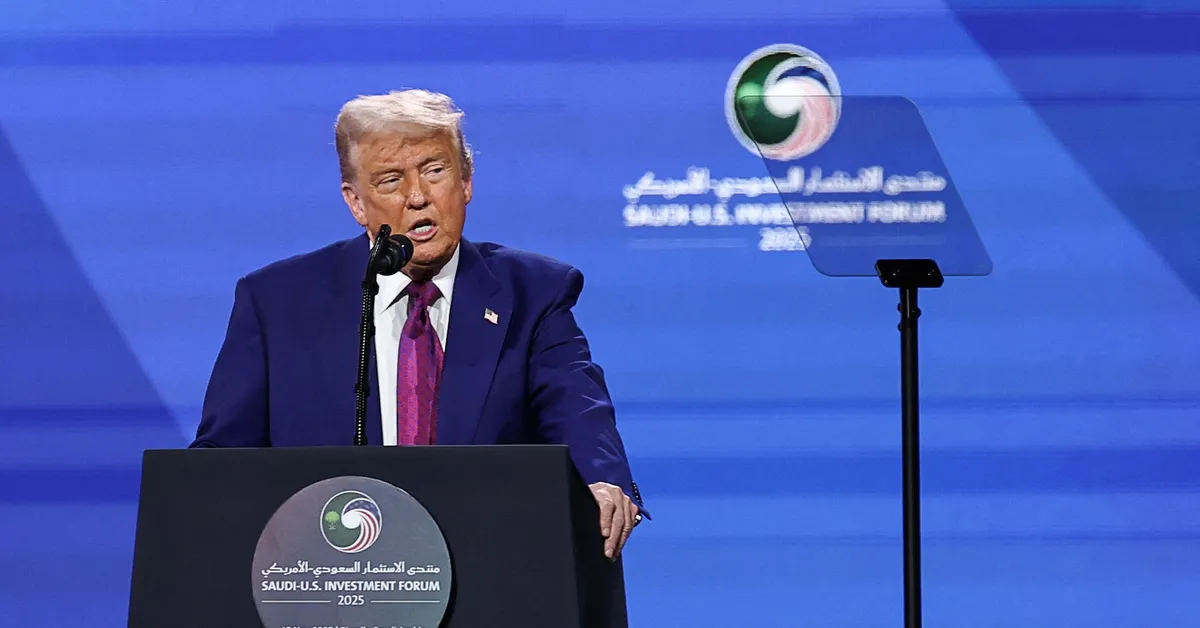
In a significant policy transformation, President Donald Trump declared on Tuesday that he would initiate the process of lifting sanctions on Syria, following a request from Saudi Arabia's Crown Prince, Mohammed bin Salman. This announcement comes just before an anticipated meeting with Syria's Islamist President, Ahmed al-Sharaa, scheduled for Wednesday in Saudi Arabia. A White House official confirmed the planned encounter between Trump and Sharaa, a former al-Qaeda commander who assumed leadership after the ousting of Bashar al-Assad.
During an investment forum in Riyadh, Trump expressed optimism regarding Syria's future, stating, "I will be ordering the cessation of sanctions against Syria in order to give them a chance at greatness. It's their time to shine. We're taking them all off. Good luck Syria, show us something very special." This bold statement highlights the U.S. administration's commitment to fostering a new relationship with Syria.
The decision to lift sanctions was reportedly influenced by discussions with both the Saudi Crown Prince and Turkish President Recep Tayyip Erdogan, who have been strong advocates for this policy change. Despite the move, there remains considerable skepticism in Israel regarding Sharaa's government, with officials labeling him a jihadist, despite his severance of ties with al-Qaeda in 2016.
Trump emphasized that while the sanctions had previously served an important purpose, it is now time for Syria to make progress. He announced that steps were underway to restore normal relations, including a meeting between U.S. Secretary of State Marco Rubio and his Syrian counterpart later this week. The sanctions, originally imposed during Assad's regime, have severely restricted Syria's access to the global financial system, stifling foreign investment and trade, and obstructing reconstruction efforts following years of conflict.
Syria's Foreign Minister, Asaad al-Shibani, welcomed the announcement, describing it as a turning point for the Syrian populace in their pursuit of rebuilding their nation. He stated, "We stand ready to foster a relationship with the United States that is rooted in mutual respect, trust, and shared interests." Shibani also suggested that Trump could achieve a historic peace deal, benefiting U.S. interests in the region.
Historically, Syria under Assad has maintained a contentious relationship with Israel, fostered close ties with Iran and Russia, and had turbulent interactions with Western nations. Since December, Israel has occupied parts of Syrian territory near the Golan Heights, which it has controlled since 1967, and continues to conduct regular airstrikes within Syria. Notably, Syrian officials have recently indicated a willingness to explore détente and potential peace with Israel.
Sharaa, who led al-Qaeda's official branch in Syria for years, has a controversial past that includes five years of imprisonment in the United States. In December, the U.S. removed a $10 million bounty placed on his head. Most congressional sanctions against Syria, including a stringent 2019 sanctions package, contain provisions that allow the president to suspend them if he considers it beneficial to U.S. national security.
The United Nations welcomed the U.S. decision to lift sanctions, highlighting the importance of relief to assist in Syria's reconstruction and the recovery of its people after a decade of conflict. U.N. spokesperson Stephane Dujarric stated, "It was important for us to see relief on sanctions on Syria to help the reconstruction of Syria, to help the Syrian people recover from more than a decade of conflict."
As the situation develops, it remains unclear whether the U.S. will advocate for the lifting of sanctions on the Hayat Tahrir al-Sham (HTS), which has been on the U.N. Security Council's sanctions list for over a decade due to its ties to al-Qaeda. The implications of this policy shift on regional stability and U.S. interests will be closely monitored in the coming weeks.